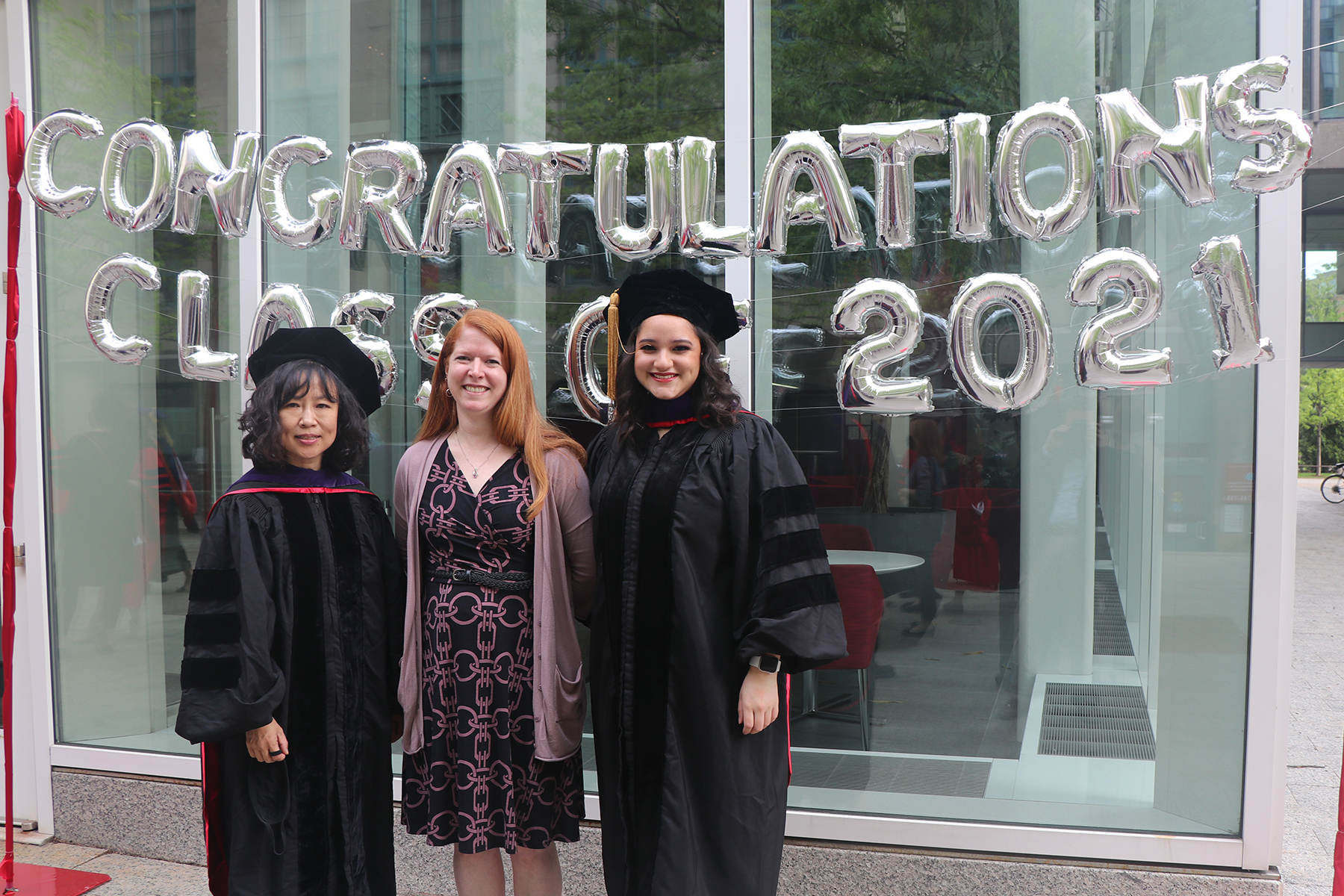Tax Credit
First graduates to earn BU Law’s Master in the Study of Tax Law benefit from rigorous training in top-ranked Graduate Tax Program.

Left to right: Jenny L. Hong (MSL’21), Director Christina Rice (JD’07, LLM’13), and Danielle De Souza (MSL’21)
Tax Credit
First graduates to earn BU Law’s Master in the Study of Tax Law benefit from rigorous training in top-ranked Graduate Tax Program.
Jenny L. Hong (MSL’21) was halfway through earning a six-course certificate in estate planning from Boston University School of Law when Christina Rice (JD’07, LLM’13) asked her if she would be interested in taking her studies a little further.
Rice, the director of BU Law’s Graduate Tax Program (GTP), wanted Hong to know about a new Master in the Study of Tax Law (MSL) she was creating. To earn the degree, MSL students would take 12 classes, including foundational tax law training, legal research and writing, and electives covering topics ranging from tax technology and exempt organizations to taxation of trusts and fiduciaries.
Hong didn’t hesitate.
“Tax law is such a complicated system,” she says. “I can learn much more in 12 courses than I can in six.”
Hong and Danielle De Souza (MSL’21) are the first two graduates of the MSL program. Hong, who helps run a family real estate business, had already worked for decades in financial planning roles before starting her MSL. After graduation, she was recruited by New York Life Insurance Company and now works as a financial professional advising clients on wealth management. De Souza enrolled in the MSL program immediately after earning her undergraduate degrees in accounting and business administration and has a job lined up at EY in 2022.
“I think the two of them really kind of illustrate just how broad the type of student is that we are looking to attract,” Rice says.
The MSL program was created to fill a gap in the market. According to feedback Rice heard from Big Four accounting firms, entry-level accountants lacked some of the skills necessary to handle complex client matters such as cash tax planning, wealth management, international restructuring, and mergers and acquisitions.
Our students really understand the intricacies of the law and can take a client’s problem and figure out the most tax-efficient way of solving it.
“They were great on compliance, but not so good at the consulting side of their tax practice,” Rice explains. “That started us wondering: Could we create a new degree and give people the skills they need earlier in their career?”
The program is unique because it does not require candidates to have previous professional experience or a law degree and—even before the pandemic—students could take courses online, in person, or part time. The curriculum is rigorous. MSL enrollees take courses with LLM and JD candidates and are integrated into the broader Graduate Tax Program at BU Law. Rice says the MSL is designed to be more comprehensive than master’s in tax programs offered by business schools.
“Our students really understand the intricacies of the law and can take a client’s problem and figure out the most tax-efficient way of solving it,” she says.
De Souza and Hong, who both focused on estate planning within the MSL program, came to BU Law for different reasons. De Souza knew from previous internships at EY during college that she wanted to start her career working with high–net worth individuals on wealth management issues. Hong—closer to retirement age and having put three children through college—was interested in learning how to manage and plan for retirement.
“We went from wealth accumulation to wealth preservation and distribution,” Hong says. “Estate planning is what most interested me.”
The pair praised the MSL faculty, many of whom are BU Law alumni and full-time practitioners serving as enforcement staff at the IRS or accountants at large and small private firms.
“They teach not only theory but also the practical skills you’ll use in real life,” Hong says.
De Souza particularly enjoyed an introductory estate planning course with Adjunct Professor Melissa Langa (LLM’96).
“The professor explained things really well and broke them down. It was very engaging,” she says. “Every time I went into class, I knew: This is what I want to do.”
Hong was impressed by the cutting-edge nature of the work. For a class with Adjunct Professor Richard T. Ainsworth (LLM’90), she wrote a 27-page paper on how President Biden’s tax policies would impact private foundations and charitable trusts. The dynamic state of the law posed a challenge for the assignment, but Hong—with input from Ainsworth—was up for it.
“I must have made 50 revisions,” Hong laughs. “Even right now, I could still make revisions.”
For De Souza, the MSL program confirmed her chosen career path. But Hong’s personal desire to learn more about estate planning turned into a career opportunity. She says she received many invitations for interviews through BU Law’s campus recruiting program because of her new expertise in tax and in estate planning.
“The pandemic really changed a lot of how people think and their priorities,” she says. “I kept thinking: What if I got COVID? Am I ready? No, of course not. I realized so many people are not prepared for this kind of unpredictable event. This is a very rewarding career—not only for my family but for everyone who needs this kind of advice.”
De Souza, who took a combination of online and in-person courses, and Hong, who earned her degree remotely but traveled to campus a few times each semester, say they also benefitted from getting to know their fellow students.
Rice says building community happens naturally in a niche area like tax.
“I refer to us as a family of happy tax nerds,” she laughs. “We’re all focused on this one sliver of the law. If you start talking to somebody about the thing you’re excited about, there’s a good chance the person you’re talking to will be excited about that thing too.”
